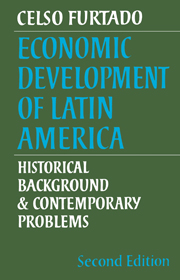Book contents
- Frontmatter
- Contents
- Tables
- Preface to the second edition
- Preface to the first edition
- Abbreviations
- Maps
- PART ONE FROM THE CONQUEST TO THE FORMATION OF NATION-STATES
- PART TWO ENTRY INTO THE SYSTEM OF INTERNATIONAL DIVISION OF LABOUR
- PART THREE THE TRADITIONAL STRUCTURAL PATTERN
- 7 Characteristics of agrarian structures
- 8 Distribution and utilisation of the social income
- 9 Monetary and foreign exchange systems
- PART FOUR CHARACTERISTICS OF THE INDUSTRIALISATION PROCESS
- PART FIVE REORIENTATION OF DEVELOPMENT IN THE RECENT PERIOD
- PART SIX INTERNATIONAL RELATIONS
- PART SEVEN INTRA-REGIONAL RELATIONS
- PART EIGHT STRUCTURAL RECONSTRUCTION POLICIES
- Bibliography
- Index
9 - Monetary and foreign exchange systems
Published online by Cambridge University Press: 25 January 2010
- Frontmatter
- Contents
- Tables
- Preface to the second edition
- Preface to the first edition
- Abbreviations
- Maps
- PART ONE FROM THE CONQUEST TO THE FORMATION OF NATION-STATES
- PART TWO ENTRY INTO THE SYSTEM OF INTERNATIONAL DIVISION OF LABOUR
- PART THREE THE TRADITIONAL STRUCTURAL PATTERN
- 7 Characteristics of agrarian structures
- 8 Distribution and utilisation of the social income
- 9 Monetary and foreign exchange systems
- PART FOUR CHARACTERISTICS OF THE INDUSTRIALISATION PROCESS
- PART FIVE REORIENTATION OF DEVELOPMENT IN THE RECENT PERIOD
- PART SIX INTERNATIONAL RELATIONS
- PART SEVEN INTRA-REGIONAL RELATIONS
- PART EIGHT STRUCTURAL RECONSTRUCTION POLICIES
- Bibliography
- Index
Summary
Failure to adjust to the rules of the gold standard
In an earlier chapter it was pointed out that the world economic crisis of 1929 dramatically revealed structural changes that had been taking place in the world economy for some time. Among such changes we must mention the tapering off in world demand for most primary products. The crisis emphasised the magnitude of the ‘external vulnerability’ of economies specialising in the production of raw materials, among which the Latin American economies were prominent.
The financial movements involved in the system of international division of labour, based on so-called comparative advantage, were regulated by the Gold Exchange Standard, which assumed the definition of all currencies in terms of their gold value, free convertibility on the basis of a fixed rate of exchange (at least in so far as foreign transactions were concerned) and the free transfer of funds on the basis of ‘foreign exchange reserves’ held by the monetary authorities of each country. In countries with a diversified economy, characterised by some degree of substitutability between imports and home-produced goods, any sharp fall in exports due to external factors could be offset, to some extent, by an increase in domestic supply. Proper management of monetary reserves and foreign credit, in conjunction with a judicious policy of domestic expansion, could be sufficient to divert productive activity towards new types of export and towards the satisfaction of domestic demand formerly supplied by imports.
- Type
- Chapter
- Information
- Economic Development of Latin AmericaHistorical Background and Contemporary Problems, pp. 93 - 99Publisher: Cambridge University PressPrint publication year: 1977

